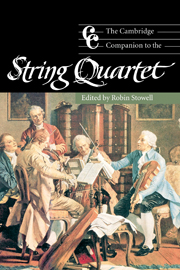1 - The string quartet and society
from Part I - Social changes and organological developments
Published online by Cambridge University Press: 28 September 2011
Summary
We are ‘living in a bad time for practising the intimate, introspective art of the string quartet’. So writes a UK broadsheet journalist at the dawn of the twenty-first century. He is talking, be it said at once, about the difficulties of making a living solely as a professional chamber ensemble that plays the classical repertoire and, though despairing of dwindling public interest, and of string quartets selling out to razzmatazz and pop, he ends with an optimistic assessment of fresh ideas for drawing in new audiences. Be that as it may, his initial, nostalgic message is clear: it was not always thus. Indeed, times have changed as far as the string quartet's relationship with society is concerned: and like other types of music, the string quartet has a social and cultural history, well worth exploring.
This chapter attempts to draw out some of the central threads in that history, by presenting an outline of the changing social function of the string quartet, along with fluctuations in cultural attitudes towards it, from mid-eighteenth-century central-European beginnings right up to the present. The main theme is the relationship between performers and repertoire on the one hand and audiences or ‘society’ on the other – at root demonstrating a shift from participation to listening. But there is counterpoint, too, not least in the intimacy of the quartet genre and in how, as the very epitome of the chamber music ideal, it has responded to the problems and challenges that external factors have brought.
- Type
- Chapter
- Information
- The Cambridge Companion to the String Quartet , pp. 1 - 18Publisher: Cambridge University PressPrint publication year: 2003
- 28
- Cited by

